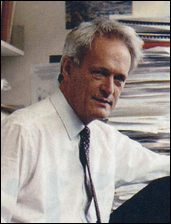Richard Peto, PhD
Born: 1943

The BBC describes Peto as: “… enfant terrible of epidemiology, passionate and angry at the impossibly large burdens of disease caused by totally preventable factors, especially tobacco, and unafraid of rocking a few boats to get his message across.”
The BBC promotes Peto as: “Knighted for his services to epidemiology and cancer prevention, Sir Richard has proved the worth of many medical treatments, including tamoxifen for breast cancer.
The BBC interviews Peto as: “Hippies did not understand a lot about . . real work. I went off to university doing science, half dropped out like some people do and then half dropped in again with statistics. I began working with Sir Richard Doll at the Medical Research Council Statistical Research Unit in London. Then I found I began to love it more and more. When you start getting results it’s addictive. You suddenly realize that results on paper can save lives in the real world.”
When the BBC queried Peto about major issues facing epidemiology, he replied:
“For epidemiology as a whole it has been a ridiculous amount of restriction on the use of medical records. Much of the constraint on research is done in the name of ethics but it is unethical. It’s all about using medical records for a purpose that they were not originally obtained. So what? It’s done good not harm. This kind of work saves lives. It gives us clear answers. The key is to take the big causes – smoking, blood pressure and cholesterol – seriously.”
Peto was educated at Cambridge (MA 1974) and the University oif London (MSc in statistics, 1967) and joined the research of Richard Doll at Oxford in 1974. In 1975 he set up the Clinical Trial Service Unit and Epidemiological Studies Unit at Oxford and in 1992 became professor in medical statistics and epidemiology there. His contributions have been in CVD and cancer, in major meta-analyses of trials, in conducting large-scale trials of therapy, and in observational studies of geographic differences in cancer and CVD and exposures, particularly in huge Chinese populations.
Peto was early to recognize and quantify and correct for regression-dilution bias in effects on prediction of the usual single measures made in epidemiological studies. He now operates a major center at Oxford, the CTSU or Clinical Trial Service Unit devoted to primary and secondary prevention trials. (HB)
Sources
BBC News online. “Experts Examined – Sir Richard Peto.” Accessed on Jan. 11, 2007: http://news.bbc.co.uk/2/hi/health/4530057.stm